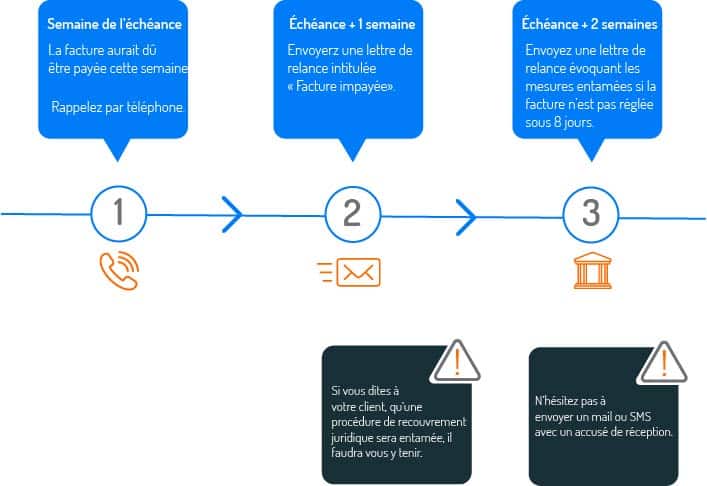How to avoid unpaid bills? Here are 5 rules to follow.
Preventing the risk of non-payment is not as complex as it seems, including for VSEs/SMEs. It just takes a few good habits to form. Here are some basic rules to follow.

COLLECT THE RIGHT INFORMATION ABOUT YOUR CUSTOMERS
You must check the financial situation of your customers before granting them granting a delay of payment . You must also make sure that the information about your clients is regularly updated (changes in capital, legal form, billing address, names and contact details of your contacts, etc.). This will allow you to assess their creditworthiness and the risk of non-payment (credit risk) that weighs on your business relationships.
3 types of tools are available to help you:
- Legal and financial information
Legal information is the public data that companies are legally obliged to communicate to INSEE, the clerks of the commercial courts, etc. Gathered on databases such as company.com they allow you to examine the balance sheets and to check the absence of warning signs of financial difficulties of your partners (registration of liens by the Urssaf, the Treasury, etc.).
However, the legal and financial information available is becoming increasingly scarce. Since the Macron law was implemented in 2015, the number of company balance sheets filed confidentially with the registry has more than doubled: in 2018, 53.6% of balance sheets were published confidentially compared to 26.5% in 2015. This trend will continue, so it will be increasingly difficult to obtain this information.
The information that is still available or accessible is often too old, 6 to 18 months old, during which time your client’s financial situation may have changed significantly.
Published balance sheets, by nature, illustrate the financial health of your clients at a given point in time, over a previous period, and do not take into account what has happened since then or even what is happening now.
Another limitation is that the user must decide on the reasonable credit terms for his customers based on the figures provided.
- Value-added databases
Some databases such as Infolegale or Dun&Bradstreet also provide an opinion on the solvency of companies and the outstanding credit to be granted to them. Value-added databases offer more up-to-date information, because to public data, they add information collected from multiple other sources (credit insurers, banks, etc.). A rating is assigned on the solvency of the companies monitored. Thus, they help guide credit limit decisions. Unfortunately, data aggregation is not enough for certain high-stakes decision-making: not all countries are covered either, and finally, company sheets are not necessarily up-to-date (regular updating is most often done on larger companies).
- Commercial information made on demand
Commercial information : fresh, exclusive and reliable information in France and abroad. It consists of a customized survey to gather current information on the company’s figures and business dynamics at a given time; this field information, combined with the analysis of available and collected financial data, finally provides truly exhaustive information on the health of a company and allows for the best possible assessment of credit risks:
- The commercial intelligence investigation concerns legal entities, regardless of their legal form, whether they publish their accounts or not, whether they have been registered recently or not.
- The data is collected “on the ground” and directly from your contacts, such as: confirmation of an imminent collective procedure, quality of banking relations, main suppliers or customers, state of the order book, social climate, etc.
- To date, it is the only solution available that remains reliable for evaluating the financial health of your French or foreign clients, regardless of their geographical base.
If you are looking for a solution to assess the solvency of your customers, ask our team of investigative analysts .
GENERAL TERMS AND CONDITIONS OF SALE: TAKE CARE IN DRAFTING
To effectively protect yourself from the risk of non-payment, have your customers sign GTCs that are truly adapted to your company’s activity. Well-drafted, your T&Cs constitute an effective shield to secure your commercial relations .
RISKS OF NON-PAYMENT: INVOLVE AND RAISE AWARENESS AMONG YOUR TEAMS
The information and impressions collected by your teams in the field (salespeople, deliverymen), or by the various departments that interact with your customers (quality, logistics, accounts receivable, sales, etc.) are valuable because they are ‘fresh’ and can explain certain data in the reports. A growing stock, the loss of a large market, a higher team turnover, more complaints …
These are all signals that can alert you. It is therefore very important to establish a cash culture at all levels of the company . How ? By bringing up this subject on a recurring basis during department meetings, training sessions, during annual conventions or in internal communication documents.
More than that, CFOs, credit managers and sales managers need to speak the same language and communicate with each other regularly.
Remind everyone that the performance of the company, beyond the purchase orders or the invoiced turnover, is mainly measured by the turnover collected and the available cash. Selling is good, getting paid on time is even better. A real customer is a customer who pays your bills on time.
MAKE SURE YOUR INVOICES ARE CORRECT
The quality of invoicing is essential in the business process for any company. Check your invoices for clarity, accuracy and completeness. The regulations in this area are strict, it is a constraint but it is also a help: there are billing rules There are also constraints to be respected by your customers (payment deadlines, fixed compensation due for any invoice in delay of payment…).
To save time and avoid errors, rely on accounting software packages. There are simple and intuitive ones like Sinao that can adapt to your market and functional environment.
DEFINE A CLEAR AND ROBUST RECOVERY PROCESS
Educate your customers on the need to meet deadlines. To do this, make sure your invoice dunning process is clear, paced and well tracked over time. This will allow you to react quickly in case of non-compliance with the payment date defined in the contractual conditions.
The faster you follow up with a customer who has not paid their bill on time, the more credible your approach will be, and the better your chances of getting your money back quickly.
Here is an example of a dunning process:

If you have to deal with a peak in activity, an unusual volume of unpaid invoices , or a one-time or chronic lack of staff, do not hesitate to outsource your follow-up and collection . The help of good professionals will save you precious time.
If you are looking for a customized solution to increase your cash flow and reduce your customer credit risk, our team of experts will work with you to determine the best approach for your situation.
